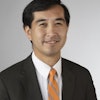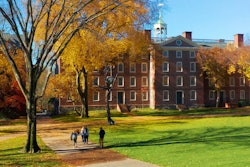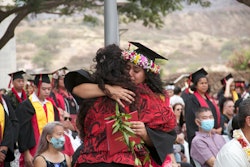Title: Associate professor of higher education, University of Arizona: Ph.D. and M.A. in higher education, UCLA; B.A. in social ecology with a minor in African-American studies, University of California, Irvine
Age: 39
Career mentors: Gary Rhoades and Iliana Reyes, University of Arizona; Simon Marginson, University of Melbourne
Advice for new faculty members: “First, as Gary Rhoades instilled in me when I was first hired, know your worth. You have as much to offer and say as an assistant professor as a full professor. Second, know what is most important to you, and spend your time accordingly, keeping in mind that not everything that is urgent is important.”
It was her parents’ strong work ethic and sheer determination that was the driving force behind Dr. Jenny Lee. Immigrating to San Diego from Seoul, South Korea, at age 3, Lee watched her parents overcome challenging obstacles in order to make a living for their family.
“Although my parents did not earn any degrees in the U.S. and barely spoke English, they instilled in me the value of hard work,” Lee says. “Whether they worked in an assembly line factory, deli shop, and, finally a dry cleaner, my parents served as a model in my approach to education. They taught me that, while we can’t always choose our circumstances, we can always work to improve them.”
Lee took that advice to heart. “I clearly recall a time when I was torn on whether to go off to college or stay with my family in order to help the family business. When I shared my inner struggle with my mother, she told me that I must go to college so that I would not have to work with my hands as she and my father had done throughout their lives.”
For the past 15 years, Lee has devoted her time to teaching, service and research on college access for underserved populations. “I created a service-learning outreach course while I was a graduate student at UCLA and then a similar course when I became a faculty member at the University of Arizona. These service-learning outreach courses prepare college students as mentors and tutors to low-income middle and high school students in local underserved communities. With the support of private donations and a foundation grant totaling almost $500,000, there are now approximately 100 college students serving six local schools per semester and countless secondary students who are now preparing for higher education. I continue to research inequalities in college access but have also since started investigating issues of access and educational mobility globally.”
As a first-generation college student, Lee has focused her research interests on college access, primarily because of her personal experiences as an immigrant with little knowledge of the educational system and how to access higher education.
“I became interested in ways that I can better understand the experiences of international students and higher education in my country of origin, South Korea. My father died before I completed my doctoral studies, but, some time before he passed away, he told me that I should consider using my degree to help impact Korean education.”
Lee has taken her father’s suggestion seriously. During her sabbatical last year, she devoted time and research toward Korea. Her international work included learning about the experiences of international students and higher education in South Korea.
“In addition to my research on Korean higher education, my international research seeks to challenge and re-conceptualize traditional views of international higher education that tend to minimize or disregard the role of developing countries and the human side of migration for students from these countries,” Lee says.
She has authored and also co-authored more than 40 publications. Her work has not gone unnoticed by Dr. Jeffrey Milem, department head of Educational Policy Studies and Practice and director of the Center for the Study of Higher Education at the University of Arizona.
“I’ve been her colleague for the past five and a half years. She’s been a remarkably productive scholar in terms of quality and quantity of work,” Milem says. “She has a strong commitment to issues of social justice and equity. She is a great person who is widely respected by colleagues and students.”
“My personal rewards include knowing that my work will make a positive difference in the lives of others. Whether it is a doctoral advisee, undergraduate in my class or a fellow scholar who is informed by my research, I believe that making a difference is all that matters in the end,” Lee says.





















